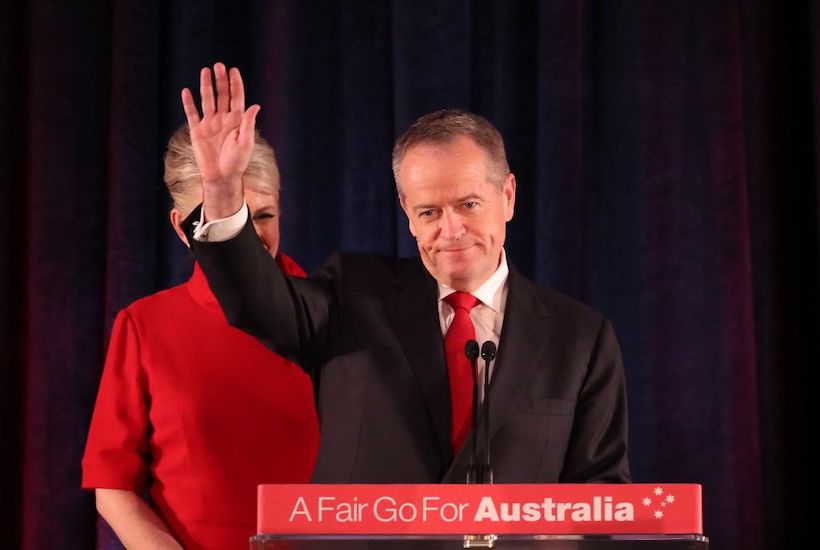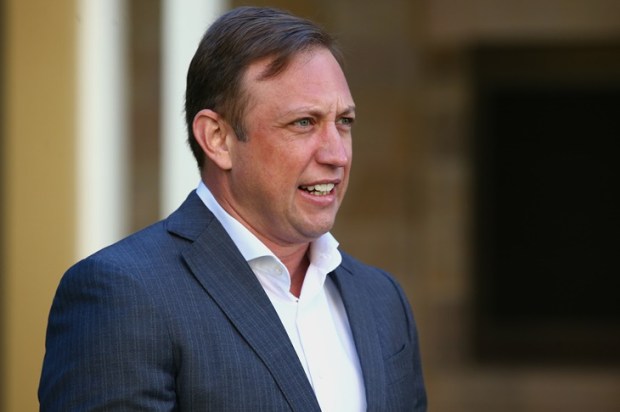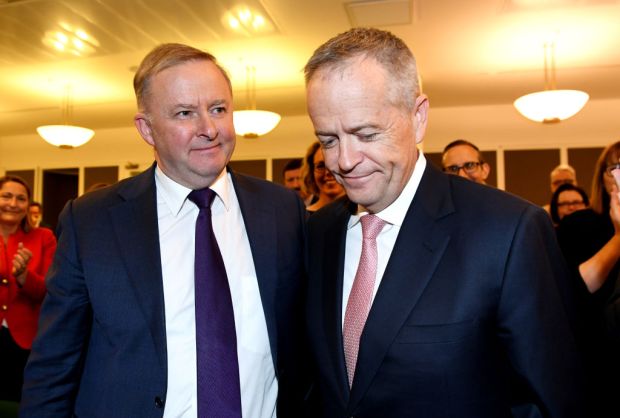This is the second in a series of articles on shifts in Australian politics and the future of the ALP.
Let’s tell it like it is. Yesterday’s review into Labor’s 2019 federal election result misses the point completely.
Labor didn’t suddenly collapse around 8.00 am on May 18, 2019. It might look that way if you take one election in isolation, as this review does. But the truth is that Labor has structural and generational problems going back three decades; the issue is not that the campaign threw away a win (although mistakes were certainly made) but that for six years and six weeks Labor failed to address the problems at its core that has held it back.
It’s not one leader, or one campaign, or one set fo policies, or one Clive Palmer advertising blitz, or one Coalition slogan.
The problem is Labor.
Since 1990, Labour’s primary vote has declined steadily. It has bled support to the Greens Party on the post-materialist, socially liberal left and to parties like One Nation and the UAP on the socially conservative and economically populist right, as well as to the Liberal Party itself.
The Greens are not a major threat to Labor — their vote is high enough to win in only one seat (Melbourne) and at most could only threaten Labor in perhaps five or six others. This is largely driven by demographic change in inner cities, as high housing costs price working and middle-class Australians, particularly families, out of these areas. Greens voters have the highest average income of any party’s supporters and the highest level of education (these two socio-economic factors are related). They are not, economically speaking, the people Labor has historically existed to represent; perhaps most importantly, Greens parliamentarians are compelled by the political realities of their constituencies to support Labor in parliament.
The loss of Labor voters in the outer suburbs and regional centres, to both populist right parties and to the Liberal Party, is of far greater consequence. It is these voters who swung hardest against Labor at the 2019 election. They are socially cautious, if not ideologically conservative, and while they see a role for government in service provision and infrastructure and support a social safety net, they primarily view their own economic situation as more important than social or environmental issues and government’s role as not to redistribute wealth but to foster a growing economy. Rather than take a “bosses versus workers” approach to improved wages and better jobs, they see the economy at large as their best guarantee of success – in short, if there are jobs being created and strong economic growth, I can get a new job if I lose my old one or want a bigger pay packet.
Labor began to lose this second cohort of voters in the early 1990s as it oversaw the decline of manufacturing, embraced Green language on the environment and most tellingly gave Australia “the recession we had to have”. As Dr Nick Dyrenfurth has noted in his new Connor Court book ‘Getting the Blues’, the cumulative effect of these decisions and this language was to lose not just traditional Labor voters but also their children and grandchildren.
They decided that Labor had left them behind.
Beyond Keating, as the macroeconomy has figured more and more heavily in voters’ concerns, Federal Labor has had less and less to say about economics. This campaign approach says that the economy and national/border security are Liberal strengths while health and education are Labor ones, so we should not talk about the economy or national security.
This approach was taken to an extreme in 2019, with Labor using its budget reply speech to talk about cancer treatment (a thoroughly good cause, but not in a budget reply). Labor failed to highlight the not one but TWO rises in unemployment in the election campaign period — a stunning oversight not mentioned in the review. And Labor refused to discuss the Coalition doubling the national debt in just five years without a GFC to deal with or major nation-building projects to fund.
The problem with not talking about the economy is that every national election is a referendum on economic management. If you don’t talk about it, you won’t be trusted with it.
Franking credits and negative gearing were two policies that weren’t well thought through. But, as Labor people will tell you with confusion, the swings against Labor were biggest where the impact of those policies were least! The answer to this is obvious – if you are not trusted to run the economy, you will certainly not be trusted to reform it.
It is extraordinary that despite the Liberal Party having been the party of radical reform over the last 25 years — Fightback!, the Howard/Reith industrial relations changes, the GST, WorkChoices and so on — and Labor being the party dedicated to conserving the status quo, Labor has managed to lose so many elections in a fundamentally change-averse, cautious, conservative electorate like Australia. This is partly because Labor insists on banging on about ‘change’ (how many times does a Labor type tell you they got involved in politics to “make a difference”?) and partly because Labor insists on talking about politics in progressive, individualised language (to which I shall return).
Whatever the reasons, it is an act of political malpractice. Labor has defended wages and conditions, argued against change in industrial relations, education, health and health insurance, seen the Liberals overturn the social compact and drive auto-manufacturing offshore and managed to be seen as the party not of the cautious and sensible centre but of mad radical change.
By comparison, let’s look at the last two Federal victories won by the ALP — 2007 and 1993.
Both Rudd and Keating argued against the major changes proposed to Australia by the Liberal Party (WorkChoices and Fightback!). Both of them engaged in the economic argument and negated the Coalition’s perceived advantage in this area. Both promised tax cuts, as opposed to large redistributive spending programs.
In short, Labor wins when it is trusted on the economy, taps into the conservative instincts of the outer suburbs and is not a statist welfare party but supportive of families, communities and other social institutions that civilise our world and allow us to enjoy a good life.
So why does Labor not do these things?
Labor is now predominantly a party run, staffed and led by tertiary-educated middle-class progressives rather than a broader cross-section of backgrounds. It is almost homogenous in its collective views.
The most destructive outcome of this is that Labor people, in self-identifying as “progressive”, have moved the ALP away from being a party of economics first and social/environmental issues second time one in which a range of social and environmental stances are now almost a litmus test and certainly are seen as definitional of the party by the voting public. This means that voters whose concerns are primarily economic do not see Labor as in touch with their concerns or competent to manage the nation in their interest.
The second major outcome is that Labor has too few people who instinctively know how to speak to, and more importantly speak with, the outer suburban voters it has lost connection with over the last 30 years.
Which leads us to language.
Anyone interested in politics should read Johnathan Haidt’s ‘The Righteous Mind’. It is a seminal text, in my view.
One of Haidt’s insights is to observe that a person’s moral prism drives both their political views and the way they receive information. Understanding that politics and communication is not foundational, that there is a layer of bedrock underneath, is vital to understanding politics.
The key difference between those people who’s moral worldview is conservative and those who are progressive (“liberal” in the American designation) is that conservatives fundamentally view human beings not as individual actors but as parts of a larger whole — members of a family, part of a community, citizens of a nation — while progressives see human beings as, first and foremost, single units. Conservatives are apt to celebrate institutions and groups while progressives can see them as a restrictive, often oppressive force.
It’s worth noting that the phenomenon of people becoming more conservative as they age is accompanied by, indeed driven by, being married or in settled relationships, having children or extended family, settling in one place and belong to a community. In short, as those things become more important and people have more to belong to, they come to see themselves and others as parts of larger whole rather than as individuals.
When this is approached from the perspective of language, we can see how framing an issue in terms of, say, individual rights will appeal to progressives but repel conservatives, whereas talk of responsibilities to the greater whole attracts conservatives but repels progressives.
This, in my view, is why the Australian public’s views on asylum seekers have not changed in 20 years. Driven by left-progressives, the refugee advocacy language is all about an individual person’s “right” to asylum. By getting the language wrong, refugee advocates have ensured the merits of their argument will not matter.
By contrast, recall John Howard in 2001; “We will decide who comes this country and the circumstances in which they come”. The keywords in that phrase are “WE” and “THEY”. The first creates a bond of commonality appealing to natural conservatives; the second sets up another, different group. Not us, but them. And if there’s them, there must be an us; a group to whom we owe responsibilities.
As a party run by and for progressives, Labor doesn’t even understand how bad it’s language is. It’s very words repel the voters it needs to win, the voters it’s trying to help.
We know that people become more individualised the wealthier they become. Lower-income people tend to have a stronger view of families, communities, society in general — Haidt’s fieldwork revealed that the working classes in Brazil and in the US had more shared values than they did with the upper classes in their own countries, with the same pattern that the poorer a group, the more they valued groups and institutions.
I could be wrong about this. But if I am, why did Labor in 2019 do worse where there were more people living in families, or going to churches, or where they made less money? Especially so when Labor’s policies were designed to help exactly those people?
I am often told that Labor is not a place for conservative, or that we shouldn’t talk about economics.
But the people Labor needs to win elections, the people it was created to serve, are generally cautious, conservative (with a small c), concerned with economic management first of all and who’s own financial circumstances trump larger social or environmental issues when voting. And they don’t much like change.
Labor has been a party of progressive language and issues, with statist solutions on health and education, while trying to appeal to voters who care first about the economy, their own finances and who are fundamentally conservative.
And it wonders why it loses.
Review that.
Luke Walladge is a former senior Labor staffer and campaign director.
Got something to add? Join the discussion and comment below.
Got something to add? Join the discussion and comment below.
Get 10 issues for just $10
Subscribe to The Spectator Australia today for the next 10 magazine issues, plus full online access, for just $10.


























Comments
Don't miss out
Join the conversation with other Spectator Australia readers. Subscribe to leave a comment.
SUBSCRIBEAlready a subscriber? Log in